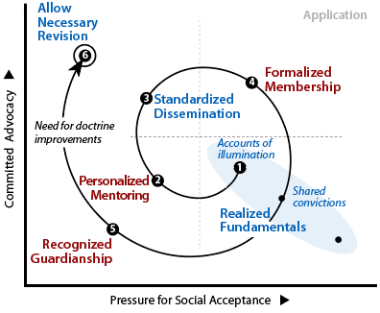Stage-6: Allow Necessary Revision
Scholarship
Any realization presented as a doctrine is only as sound as the shared of the fundamentals and related ideas. By this time, there will usually have been numerous accounts of the doctrine as a whole, and many treatises dealing with specifics.
However, as time passes, theoretical issues emerge which demand resolution. Serious inconsistencies or gaps in formulation may become evident. Communication of the doctrine also needs to give attention to socio-cultural changes because out-dated language will not suit society and is unlikely to attract adherents.

Generating new doctrinal formulations while remaining faithful to the orthodoxy requires a special sort of scholarship. There must be a mind that can appraise existing articulations and that gets immediately disturbed by anything that is vague, illogical, inconsistent, contradictory, incoherent, missing or simply incorrect.
Once the issue is identified, then the work involves finding a solution through new analyses, more observations, deeper attunement, better conceptualization, and simplification or complexification. A readiness to revise the doctrinal architecture may be required.
Example: ![]() Kabbalah
Kabbalah
Scrutiny of Revisions
Proposed revisions must be put in writing and made available to other member-adherents for scrutiny.
The first near-automatic reaction of any reader will be to determine that there is sufficient adherence to orthodox doctrine. So any revision needs to locate itself solidly in relation to the original founding doctrine, even if it addresses the very fundamentals.
Revisions that are variations or embellishments may range from illuminating to acceptable, to unorthodox and controversial but acceptable, to disruptive and therefore doubtful, and finally to heretical and therefore inherently deviant.
Example: ![]() The Shift in Psychoanalysis
The Shift in Psychoanalysis
Any ultimately established new idea commences as controversial. Such ideas must be published for the consideration and edification of the membership.
Membership bodies typically create and support meetings and conferences to present papers so that the quality and value of a revision can be discussed and debated. Membership bodies may also provide manuals, periodicals and year-books to make the latest doctrinal formulations available more widely.
In this way, over time, the new idea gets accepted and informally authorized by the membership
Possible Outcomes
Stay at Stage-6
The membership institution may refer to this work as “scientific” or "scholarly", even if the wider community rejects the use of such labels.
By this Stage-6, the school has been allowed a place in society, even if noticed by few. That may not matter if the material is esoteric or abstract and only weakly applicable to social issues. In such cases, there may be no need for any further efforts for establishment.
Example: ![]() An example is required.
An example is required.
Transition to Stage-7
By this stage, a doctrine will have attracted many adherents, been substantially developed and validated. So it becomes natural to desire that the ideas will become more part of social awareness more generally.
This desire to maximize public appreciation and support is unlikely to emerge from the membership organisation because of its tendency to a bureaucratic and doctrinaire enforcement of orthodox positions. Furthermore, in some cases, members will be far more focused on accessing government funding than socio-cultural development.
However, certain members or even non-member adherents may be able and willing to show that the doctrine can be beneficially applied to social issues in a way that is outside usual practice.
For a school to become fully established, ideas from the doctrine need to permeate society.
- Continue to consider applications of the doctrine.
Originally posted: 7-Sep-2022. Last updated: 20-Mar-2024.